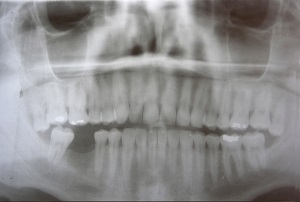
by Dr. Jacqueline S. Allen | Mar 15, 2016 | Blog, Endodontics, Root Canal
 Root canals have definitely evolved over the last several decades. For many years, root canals were synonymous with untoward events in people’s lives. Common phrases such as “I’d rather have a root canal than…” or “that hurt worse than a root canal” have haunted the specialty that I am so passionate about, for far too long. Even more recently, a comment made by our very own president painted root canals as being less popular than his bank buy-out. Come on people. Are root canals really that bad?
Root canals have definitely evolved over the last several decades. For many years, root canals were synonymous with untoward events in people’s lives. Common phrases such as “I’d rather have a root canal than…” or “that hurt worse than a root canal” have haunted the specialty that I am so passionate about, for far too long. Even more recently, a comment made by our very own president painted root canals as being less popular than his bank buy-out. Come on people. Are root canals really that bad?
The answer is simply, no; they are not! I have a phrase that I use when I complete a procedure and my patient says “well, that wasn’t as bad as everyone said it would be.” My reply is, “who wants to hear anyone say ‘my root canal was so easy; I didn’t feel a thing and it was a great experience?” Let’s face it, our world is so caught up in the horror stories that they believe to be true that they don’t really care or listen about the good experiences.
There have been so many advancements in root canal treatment! With the advent of new anesthetic techniques came the ability to treat teeth in one visit and with much less discomfort than before. With the advent of nickel titanium rotary, instruments are more efficient and have reduced clinical treatment times. With the advent of microscopes came the ability to see microfractures and additional canals that we never knew were there before. And with the advent of cone beam computed tomography, we gained the ability to discern between the teeth we should be treating, and those that are hopeless and should be extracted.
On March 27-April 2, the American Association of Endodontists will present its tenth annual Root Canal Awareness Week. This is a special week that we use to educate patients and remind clinicians of all the ways that root canal therapy has changed over the years. For the better!
Have a question about root canals? Leave a comment below or visit our website.

by Dr. Jacqueline S. Allen | Mar 8, 2016 | Blog, Endodontics, Endodontist, Root Canal
 No matter how permanent something seems in our lives, the element of change is always in play. Telephones have evolved from a device affixed to a wall that had us shouting into a large funnel to send our voice across the wires, into today’s “smartphones” that are basically tiny computers that fit in our pockets. We’ve transformed exercise gyms from places with vibrating motor-driven belts that jiggled our waists and thighs to slick suites offering Bikram “hot” yoga and Pilates.
No matter how permanent something seems in our lives, the element of change is always in play. Telephones have evolved from a device affixed to a wall that had us shouting into a large funnel to send our voice across the wires, into today’s “smartphones” that are basically tiny computers that fit in our pockets. We’ve transformed exercise gyms from places with vibrating motor-driven belts that jiggled our waists and thighs to slick suites offering Bikram “hot” yoga and Pilates.
Root canals – one of the key procedures used by endodontists to save weakened or infected natural teeth – have also evolved. The American Association of Endodontists showcase this progression during Root Canal Awareness Week, which this year will be observed from March 27 to April 2. The week casts a spotlight on how the root canal procedure has changed over the years and why endodontists are the best equipped providers to perform it.
Facts About Root Canals and Endodontists
- More than 15 million root canals are performed each year in the United States.
- Eighty-nine percent of patients who receive root canals from endodontists say that they are satisfied with the results they received.
- As root canal specialists, endodontists receive two to three extra years of training beyond dental school, and typically perform 25 root canals per week, compared to an average of less than two root canals performed each week by general dentists.
- Endodontists have the following advantages when they perform a root canal procedure: access to advanced equipment, knowledge of microsurgical techniques, and a professional focus on saving natural teeth and diagnosing and treating tooth pain.
“Family physicians turn to medical specialists, such as cardiologists and podiatrists, when their patients have serious health issues,” says Dr. Allen, an endodontist who practices with the Phoenix Endodontic Group. “General dentists turn to endodontists when your natural tooth needs to be treated with a root canal.”

by Dr. Jacqueline S. Allen | Feb 10, 2016 | Blog, Endodontics, Endodontist, Root Canal
 Having a root canal treatment is one big step toward saving an infected or damaged tooth. However, the root canal procedure itself, which has a 95 percent success rate, is only the beginning of the treatment process. There are several steps you can take – some immediately after your root canal and some over the long run – to ensure your tooth heals properly.
Having a root canal treatment is one big step toward saving an infected or damaged tooth. However, the root canal procedure itself, which has a 95 percent success rate, is only the beginning of the treatment process. There are several steps you can take – some immediately after your root canal and some over the long run – to ensure your tooth heals properly.
Caring For Your Teeth After A Root Canal
- Post-operative care. Immediately after the treatment, don’t bite down or chew with the treated tooth. You can manage discomfort with over-the-counter pain medication and by applying an ice pack to your face for 10 minutes every 20 minutes to reduce swelling. Return to your endodontist if discomfort persists or your original symptoms return.
- Taking prescribed medications. It is critical that you take all medications that may have been prescribed by your endodontist after your treatment.
- Dental restoration. Make an appointment with your general dentist around two weeks after your root canal so he or she can place a crown on the treated tooth to protect it from reinfection. A crown can also provide important support to the compromised tooth’s structure.
- Periodic endodontic appointments. Don’t skip follow-up visits to your endodontist after your restoration is in place. Your endodontist will examine the root canal by using X-rays and other assessment tools to make sure there are no signs of infection and to monitor healing.
- Good oral hygiene. You can keep your restored tooth healthy by brushing your teeth twice a day, flossing daily, and getting dental cleanings regularly.
“Some patients think their root canal is finished once they leave their endodontist’s chair,” says Dr. Allen, who practices with the Phoenix Endodontic Group. “But the treatment is a process, not an event. Following your aftercare instructions is crucial.”

by Dr. Jacqueline S. Allen | Feb 2, 2016 | Blog, Endodontist, Phoenix Endodontic Group
 Endodontics is one of nine specialties recognized by the American Dental Association, so it’s not surprising that Phoenix endodontists get many of their patients from referrals from general dentists. According to the American Association of Endodontists, 97 percent of general dentists referred a patient to an endodontist last year.
Endodontics is one of nine specialties recognized by the American Dental Association, so it’s not surprising that Phoenix endodontists get many of their patients from referrals from general dentists. According to the American Association of Endodontists, 97 percent of general dentists referred a patient to an endodontist last year.
There are several reasons endodontic referrals are made, all of which result in a better outcome for you and your teeth.
Why Phoenix endodontists receive referrals
- Experience and training – Endodontists receive two to three years of postgraduate training in this special practice area, which relates to treating the diseases of the inner dental pulp and nerves. They also typically do many more root canals than general dentists do – as many as 25 per week, versus a general dentist, who may average two root canals a week.
- Equipment – Root canals are performed with specialized equipment that includes microscopes with which to view the surgery area and files to clean out the infected canals.
- Ability to treat complex or unusual cases – Many patients who are referred to an endodontist have tooth roots that may be curved, have multiple roots for one tooth, or have other anomalies. Endodontists rely on their additional training and expertise to guide them through successful treatment of these unique cases.
- Ability to make the treatment comfortable – Endodontists can often perform root canals and other related procedures more quickly than general practitioners, which can result in greater comfort and reduced anxiety for a patient.
“Your Phoenix endodontist has close professional relationships with many general dentists in the Valley,” says Dr. Allen, who practices with the Phoenix Endodontic Group. “We are able to provide fast, efficient, successful treatments within our area of practice, so general practitioners may focus on providing other services.”

by Dr. Jacqueline S. Allen | Jan 27, 2016 | Blog, Endodontist, Phoenix Endodontic Group
 One of the most traumatic dental injuries a person can experience is having a permanent (“adult”) tooth knocked out. Many knocked-out teeth happen as a result of sports injuries or other accidental blows to the face. The good news is that if proper steps are followed immediately after the tooth is dislodged, it is possible for your Phoenix endodontist to help you save the tooth.
One of the most traumatic dental injuries a person can experience is having a permanent (“adult”) tooth knocked out. Many knocked-out teeth happen as a result of sports injuries or other accidental blows to the face. The good news is that if proper steps are followed immediately after the tooth is dislodged, it is possible for your Phoenix endodontist to help you save the tooth.
Saving Your Knocked-Out Tooth
- Pick up the tooth by the crown, not the root. It’s essential for the tooth’s survival that you pick up the tooth by the biting surface, not the root.
- Gently clean the tooth if it is dirty … but be careful how you do it. Gently clean the tooth with water. It’s important not to clean the tooth with soap or chemicals, to scrub the knocked-out tooth, or to wipe it with or wrap it in a cloth.
- Keep the tooth moist at all times. The best ways to keep the tooth moist after cleaning it are to keep it in milk, in the contents of an emergency tooth preservation kit such as Save-A-Tooth, or to place it back inside of your mouth.
- Reposition the tooth in its socket if that is possible. The sooner the tooth is replaced, the greater the likelihood it will survive. If you can get the tooth to sit in its socket, hold the tooth in place with fingers or by gently biting down on it.
- See your Phoenix endodontist immediately. Time is of the essence with a knocked-out tooth. The first hour is crucial. If you can get to a Phoenix endodontist within the first 20 minutes for emergency treatment, that’s even better.
Once you arrive at your Phoenix endodontist, he or she will splint the tooth in place and evaluate its condition. The splint may stay in place for up to several weeks. Because the tooth has been knocked out by its roots, he or she may recommend root canal treatment to avoid infection and provide long-term stability for the tooth.
“Don’t assume that if your tooth has been knocked out, it can’t be saved,” says Dr. Allen, who practices with the Phoenix Endodontic Group. “Your Phoenix endodontist can often save your tooth, and it can remain in your mouth for a lifetime.”

 Root canals have definitely evolved over the last several decades. For many years, root canals were synonymous with untoward events in people’s lives. Common phrases such as “I’d rather have a root canal than…” or “that hurt worse than a root canal” have haunted the specialty that I am so passionate about, for far too long. Even more recently, a comment made by our very own president painted root canals as being less popular than his bank buy-out. Come on people. Are root canals really that bad?
Root canals have definitely evolved over the last several decades. For many years, root canals were synonymous with untoward events in people’s lives. Common phrases such as “I’d rather have a root canal than…” or “that hurt worse than a root canal” have haunted the specialty that I am so passionate about, for far too long. Even more recently, a comment made by our very own president painted root canals as being less popular than his bank buy-out. Come on people. Are root canals really that bad?

 No matter how permanent something seems in our lives, the element of change is always in play. Telephones have evolved from a device affixed to a wall that had us shouting into a large funnel to send our voice across the wires, into today’s “smartphones” that are basically tiny computers that fit in our pockets. We’ve transformed exercise gyms from places with vibrating motor-driven belts that jiggled our waists and thighs to slick suites offering Bikram “hot” yoga and Pilates.
No matter how permanent something seems in our lives, the element of change is always in play. Telephones have evolved from a device affixed to a wall that had us shouting into a large funnel to send our voice across the wires, into today’s “smartphones” that are basically tiny computers that fit in our pockets. We’ve transformed exercise gyms from places with vibrating motor-driven belts that jiggled our waists and thighs to slick suites offering Bikram “hot” yoga and Pilates.
 Having a root canal treatment is one big step toward saving an infected or damaged tooth. However, the root canal procedure itself, which has a 95 percent success rate, is only the beginning of the treatment process. There are several steps you can take – some immediately after your root canal and some over the long run – to ensure your tooth heals properly.
Having a root canal treatment is one big step toward saving an infected or damaged tooth. However, the root canal procedure itself, which has a 95 percent success rate, is only the beginning of the treatment process. There are several steps you can take – some immediately after your root canal and some over the long run – to ensure your tooth heals properly.
 Endodontics is one of nine specialties recognized by the American Dental Association, so it’s not surprising that Phoenix endodontists get many of their patients from referrals from general dentists. According to the American Association of Endodontists, 97 percent of general dentists referred a patient to an endodontist last year.
Endodontics is one of nine specialties recognized by the American Dental Association, so it’s not surprising that Phoenix endodontists get many of their patients from referrals from general dentists. According to the American Association of Endodontists, 97 percent of general dentists referred a patient to an endodontist last year.
 One of the most traumatic dental injuries a person can experience is having a permanent (“adult”) tooth knocked out. Many knocked-out teeth happen as a result of sports injuries or other accidental blows to the face. The good news is that if proper steps are followed immediately after the tooth is dislodged, it is possible for your Phoenix endodontist to help you save the tooth.
One of the most traumatic dental injuries a person can experience is having a permanent (“adult”) tooth knocked out. Many knocked-out teeth happen as a result of sports injuries or other accidental blows to the face. The good news is that if proper steps are followed immediately after the tooth is dislodged, it is possible for your Phoenix endodontist to help you save the tooth.